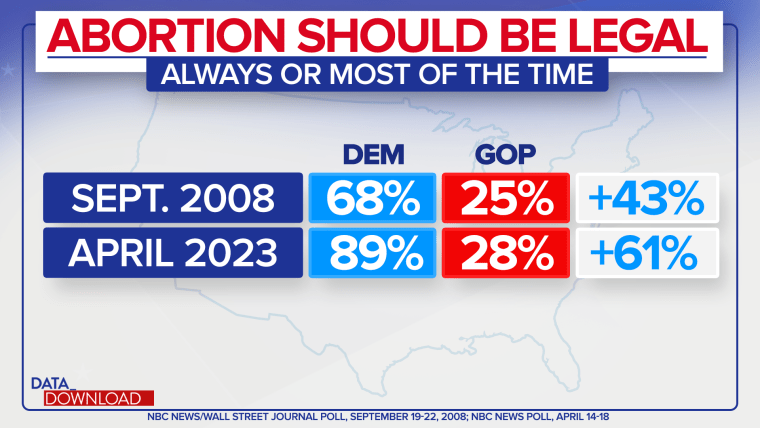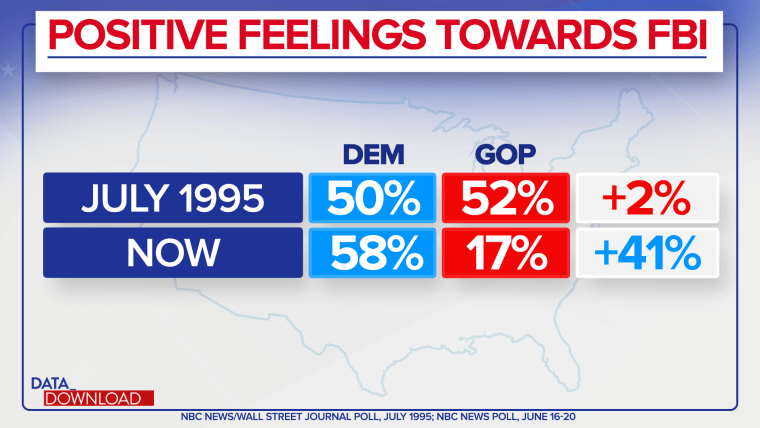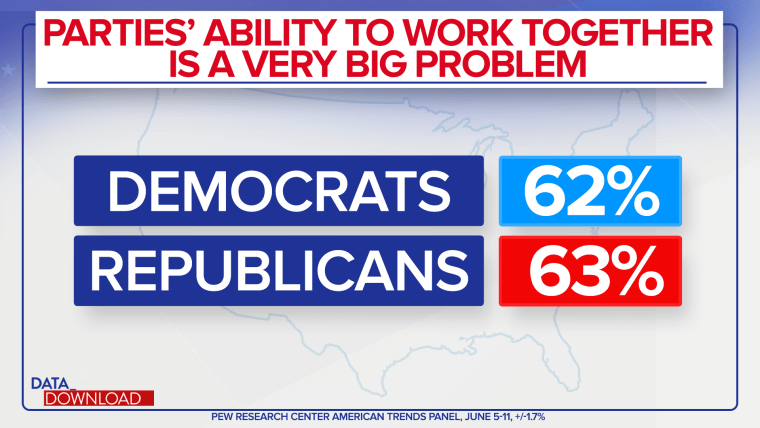The dominant theme of recent U.S. politics has been division. And nothing illustrates the remarkable depth of those divides than some of the biggest issues coming before the Supreme Court.
The numbers suggest they are only getting deeper on a variety of social and cultural fronts, according to data from the NBC News poll.
Consider abortion, an issue likely to play a very big role in the 2024 campaign. It has been a divisive front in politics for as long as anyone can remember, and the gap has only widened.

Back in September 2008, a quarter of Republicans said abortion should always be legal or legal most of the time. Among Democrats, 68% said they believed that. The partisan gap between members of the two parties was 43 percentage points.
By this spring, roughly a year after the Supreme Court’s Dobbs decision struck down the constitutional right to abortion, the partisan divide had widened to 61 percentage points. The proportion of Republicans who wanted abortion legal all or most of the time had barely moved, to 28%. For Democrats, the number had shot to 89%.
There is no reason to believe those numbers will change any time soon: Poll after poll shows the sides are fairly well dug in in their beliefs.
The same is true of the data on another topic that has been roiling politics for years and is front and center in the headlines in recent weeks: affirmative action. The Supreme Court is expected to rule this week on the use of affirmative action in college admissions, and many analysts believe it will strike down the precedent allowing it.
The nation’s two political parties have long had a difference of opinion on the issue, but the divide has blown wide open over the past few decades.

Back in 1991, about 55% of Republicans said they believed affirmative action was needed to “counteract the effects of discrimination against minorities,” while 67% of Democrats believed that. Both parties believed in the idea, with a 12-percentage point difference in the depth of their support.
Flash forward to this spring, and the numbers are radically different. Republican belief in the need for such programs had fallen to 25%, while Democratic support for them had climbed to 80%. The partisan gap had jumped to 55 percentage points on another issue that is likely to help frame the 2024 election.
It’s not just contentious issues that are dividing Democrats and Republicans in 2023. The partisan gap has become pronounced even in areas where the two parties once essentially saw eye to eye, such as their views of the FBI.

Back in 1995, Democrats and Republicans were largely aligned on the nation’s top law enforcement agency. Neither party was especially positive about the FBI — 52% of Republicans and 50% of Democrats had positive feelings toward it — but the lukewarm feelings were consistent across the partisan divide. The gap was a mere 2 percentage points.
In the most recent NBC News poll, the numbers look remarkably different. Only 17% of Republicans had positive feelings, while 58% of Democrats had positive feelings. That’s a gap of 41 percentage points and a sharp turn toward Democrats feeling far more positive about the bureau than Republicans.
There are a lot of reasons for that, of course. In recent months and years, Republican officials have often criticized the FBI, and the Justice Department in general, for what they perceive as a political bias against them and former President Donald Trump. However, it should be noted that some of that partisan shift started earlier. In 2013, the NBC News poll also found Democrats viewed the FBI more positively than Republicans, 57% to 41%.
If there is a hopeful sign, it may come from a recent survey from the Pew Research Center. That poll shows Republicans and Democrats almost completely agree on one of the biggest issues facing the country. There are big concerns about the ability of the members of the two major parties to work together.

Democrats and Republicans almost equally see the “work together” issue as a “very big problem” — 63% among Republicans and 62% among Democrats.
One could look at those Pew numbers and think, “At least most Americans seem to understand the challenge before the nation.” There is some truth to that. But that ignores the larger truth of the substantial differences over all the issues above.
Knowing you disagree with someone or some group may be a good starting point, but it doesn’t make the problems go away — especially when the gaps of disagreement keep growing.
